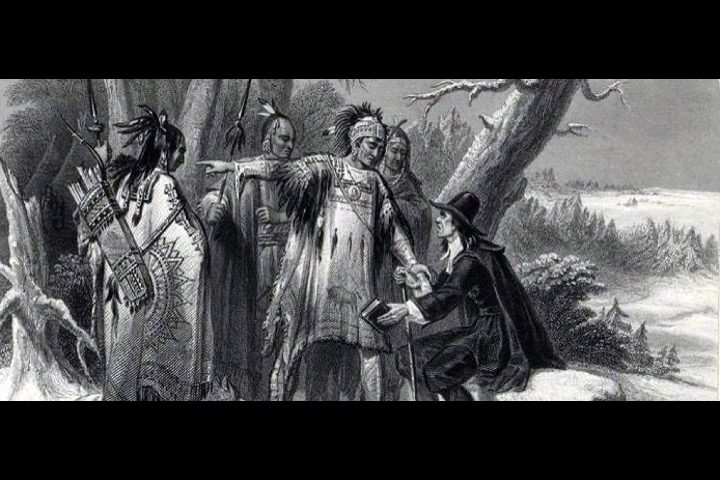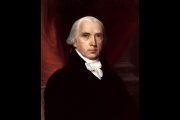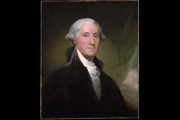
Roger Williams … successfully vindicated the right of private judgement in matters of conscience, and effected a moral and political revolution in all governments of the civilized world. — Senator William Sprague, at the unveiling of the statue of Roger Williams in the U.S. Capitol Rotunda, 1872
Introduction
Roger Williams, a significant figure in early American history, played a pivotal role in shaping the concept of religious freedom in the United States. In the early 17th century, as the Massachusetts Bay Colony was being established with religious fervor, Williams emerged as a vocal dissenter advocating for religious tolerance and the separation of church and state. This article explores his expulsion from the Massachusetts Bay Colony on October 9, 1635, and his profound impact on the development of religious freedom in America.
The Founding of the Massachusetts Bay Colony
In 1630, a group of Puritan separatists, seeking religious freedom from the Church of England, founded the Massachusetts Bay Colony. Driven by their religious convictions, they aimed to create a “city upon a hill” in which their interpretation of Christianity would thrive. However, this zeal led to a strict religious orthodoxy, which became increasingly intolerant of dissenting views.
Roger Williams: Early Life and Beliefs
Roger Williams, born in England in 1603, received a rigorous education in theology and law. However, his beliefs diverged from the Puritan orthodoxy. He believed in the separation of church and state and argued for the complete freedom of conscience. His insistence on religious tolerance made him a controversial figure in the Massachusetts Bay Colony.
Clash With the Massachusetts Authorities
Roger Williams’ arrival in the colony in the early 1630s marked the beginning of a turbulent period. He criticized the colony’s religious practices, including its treatment of Native Americans, and called for a separation of church and state. These outspoken views put him at odds with the colonial authorities, particularly Governor John Winthrop.
Expulsion From the Massachusetts Bay Colony
In 1635, tensions reached a breaking point, and Roger Williams was put on trial by the General Court of Massachusetts. He was charged with heresy and advocating dangerous ideas, and ultimately the court decided to exile him from the colony. Williams narrowly escaped a harsh New England winter, and sought refuge among the Narragansett Native Americans.
In contrast to the prevailing views among Massachusetts ministers of his time, Roger Williams held a distinctive belief: He did not deem it necessary to impose punishment on those he considered religious heretics. His interpretation of scripture, although sincerely held, posed a significant challenge to the established order of colonial society, which largely relied upon the Bible as a foundational moral compass.
Life in Exile and the Founding of Rhode Island
During his time in exile, Roger Williams established a settlement he named Providence Plantations. This settlement was unique in that it guaranteed religious freedom and welcomed individuals of various beliefs, including Baptists, Quakers, and Jews. Williams’ principles laid the foundation for Rhode Island’s government and became a beacon for religious dissenters.
In 1644 he penned a zealous defense of religious liberty. “To molest any person, Jew or Gentile, for either professing doctrines or practicing worship,” he wrote, “is to persecute him…. Having bought Truth dear we must not sell it cheap, nor the least grain of it for the whole world.”
Roger Williams’ Legacy
Williams’ ideas on religious freedom left an indelible mark on America, as his advocacy for the separation of church and state and commitment to religious tolerance were instrumental in shaping the United States. His influence can be seen in the First Amendment to the United States Constitution, which ensures freedom of religion and freedom of speech.
Conclusion
The expulsion of Roger Williams from the Massachusetts Bay Colony in 1635 was a pivotal moment in American history. His courageous stand for religious freedom and the separation of church and state laid the groundwork for the principles that would become fundamental to the United States. James Madison and Thomas Jefferson would be inspired by Williams’ passionate and principled defense of the natural right of all men to worship according to the dictates of their own consciences, and his legacy endures as a reminder of the importance of protecting the individual’s right to worship according to his conscience, free from state interference.
Finally, here are a few powerful quotations from Roger Williams, capturing his strong advocacy for religious freedom, the separation of church and state, and the importance of individual conscience in matters of faith:
- “Enforced uniformity confounds civil and religious liberty and denies the principles of Christianity and civility. No man shall be required to worship or maintain a worship against his will.”
- “There is no kind of force on earth that can straighten the crooked timber of humanity.”
- “Forced worship stinks in God’s nostrils.”
- “Freedom of conscience is the most sacred of all property.”
- “True freedom is for everyone, endowments of mind and heart, inalienable and indivisible.”
- “The world has had enough of creeds, codes and ceremonies.”



